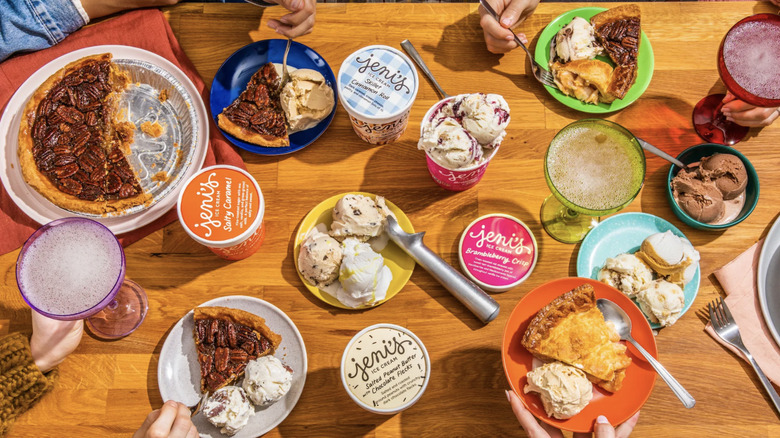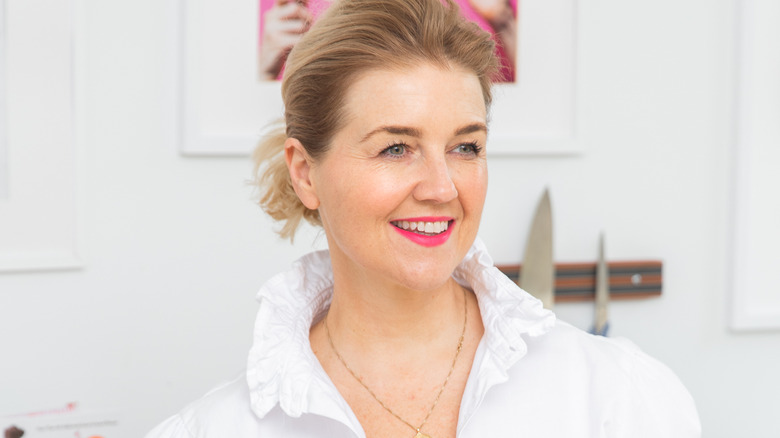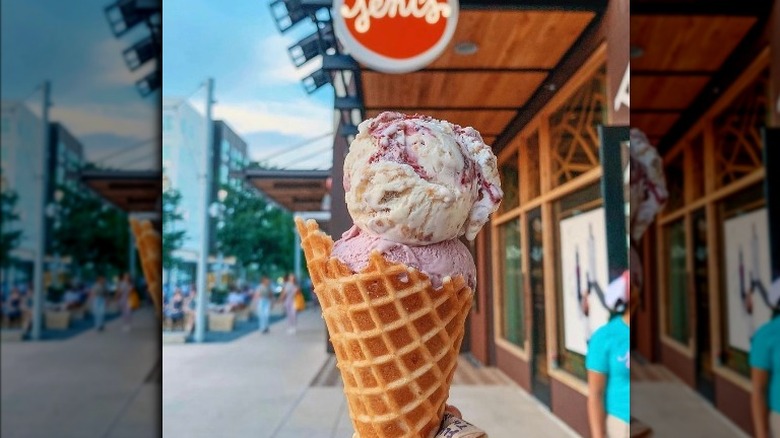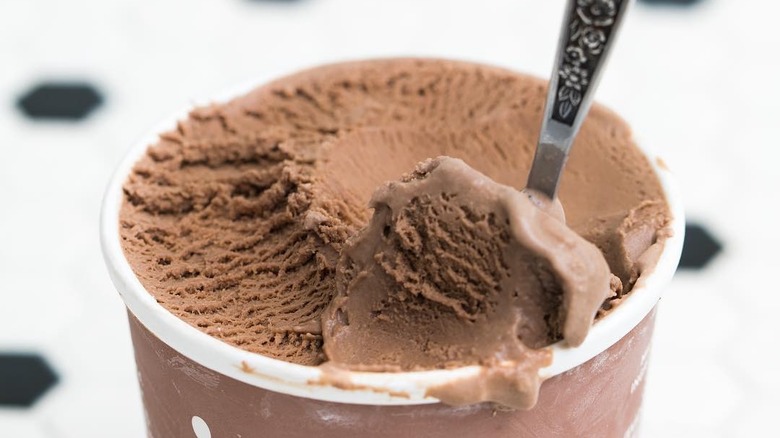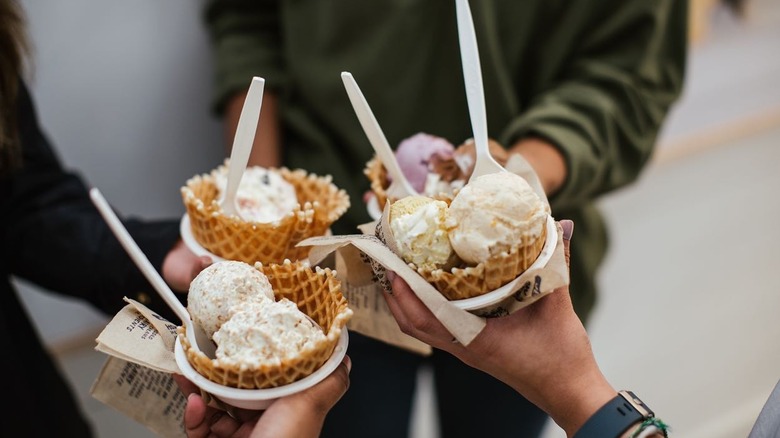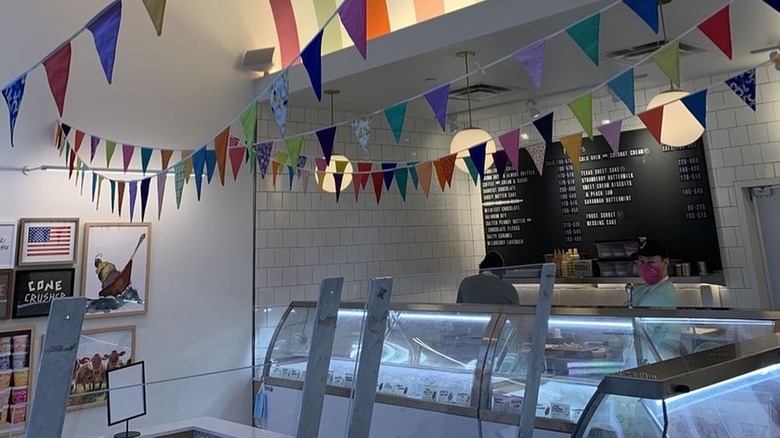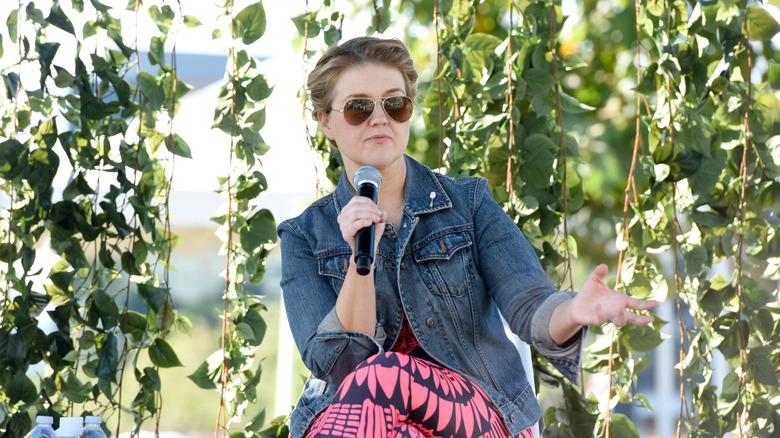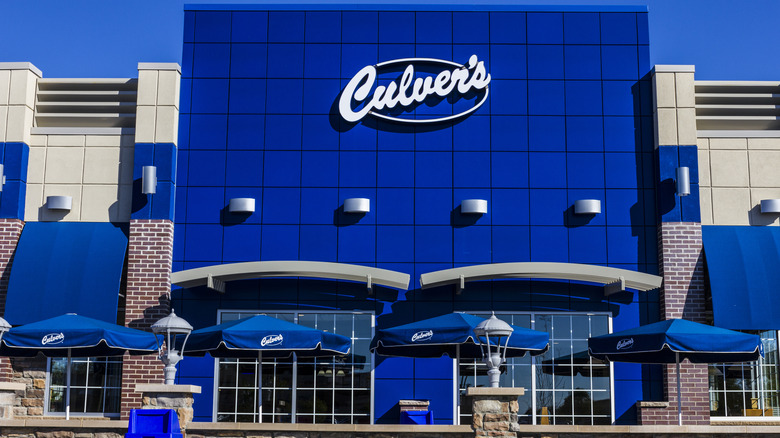Jeni Britton Dishes On What Sets Jeni's Splendid Ice Creams Apart From Other Brands - Exclusive Interview
Move over, chocolate and vanilla ... wouldn't you rather have a scoop of Goat Cheese with Red Cherries or Brandied Banana Brûlée? Jeni's Splendid Ice Creams sure are different from what you'll find in your typical supermarket freezer aisle, and maybe that's why people are willing to spend $12 a pint for them; It's no secret that Jeni's ice creams aren't exactly cheap, but loyal customers don't seem to mind. The Ohio-based company sells several dozen varieties online and at Jeni's Ice Cream stores in 17 cities across the nation — and just released a collection of limited-edition holiday flavors that include Sugar Plum, Cognac with Gingerbread, and White Chocolate Peppermint.
Wondering how founder Jeni Britton managed to grow this ice cream empire, or how she comes up with her flavors? In an exclusive interview with Mashed, the former art student gave us the scoop on how a few drops of essential oils inspired her company, why she'll put almost anything in ice cream (including cheese and fish!) and what's next for her 19-year-old premium dessert brand.
Why Jeni Britton dropped out of art school to make ice cream
What inspired you to start an ice cream company?
It's kind of funny, because now, I've been telling my story for so long, but I still, as we grow and get sort of introduced to new audiences, I think a lot of people now kind of think that we are kind of a "new" company. Or, this is kind of the classic story that you hear about people, or companies, that have been fighting forward for a really long time. But once you kind of hit it, everybody's sort of thinks that you're "new." But anyway, I actually left art school in 1996 to go make ice cream in a farmer's market. Actually, to go make ice cream at home. But a couple months later I started a little business in the farmer's market and it was called Scream Ice Cream.
And I was in business for four years and I had sort of discovered that I could tell stories through ice cream, like I could with art. And so I was studying art and art history, and just trying to figure out what I was going to do in school. And once I found ice cream that was just all I wanted to do. And I had this big vision that ice cream could be so much more interesting and so much better. And that it was really about scent and not just about what you taste on your tongue. And so we could explore that, and all this stuff, so it really hooked me. But then I started and I realized how hard business is. And I was in business with Scream for four years. I closed it. I did a lot of things right, I did a ton of things wrong, and long story short, I figured out how to do it again. I wrote a business plan. I got started as "Jeni's," back in the market, in 2002. So anyway, so it was just this very, very long journey.
But then I was back in the market for another four, or five, six years before we start growing. So all in all, I actually started in [a] farmer's market where I spent 10 years boots on the ground, making ice cream, listening to customers. And that time is just literally the foundation of everything that we do now.
How many employees were on your team when your business was at the farmer's market?
I mean, for the first half it was just me, literally. I mean, I had a 12-year-old girl whose father would do electrical work in the market and she would come hang out with me, and she was amazing. She was one of those like, really sort of precocious 12-year-olds. And she would literally help me make ice cream. She was amazing. Now she's a chef in New York. And then after ... I learned, actually, at Scream, that you can't do everything by yourself ... It's just too much. It's too much for one person to be able to do, and to try to figure out growth, and try to figure out new opportunities, and just even sustain just to exist. And so when I opened Jeni's, I knew that I would need to do enough business to create a job, or two, or 10. And so that was kind of the goal. And so back then, it was still, though, me. And Kaya, the 12-year-old, came back and worked for us, and two of her friends, and they worked for us for several years. And so it was, in the beginning, it was me and maybe three other high school kids. And then there would be 10 ... But very, very small.
I mean, my brother-in-law moved up from Nashville about a year after we started Jeni's, and he ... joined the company, and he's amazing. And eventually my husband — we're separated now, amazing relationship — but he joined the company in 2006, I think. He quit his day job. Yeah. So a small group — everybody doing everything in those early days!
Why Jeni Britton believes making ice cream is an art
You said that Jeni's "tells stories with ice cream." Can you explain what you mean by that?
So first of all, I've always loved poetry. I was raised by an artist and art teacher grandmother. And so storytelling, finding meaning behind objects and symbols [was important] ...We studied the Native Americans through central Illinois where I grew up, or the symbols behind art, and art history. We just were always looking for the meaning behind everything. Trees, I mean, being in the forest, just everything. And so when I studied art, that was a big thing for me, of course. And it is for all artists. You're trying, it's a language, it's a visual language. And so that was something that just carried into ice cream with me. And so I learned that everybody who sells, and procures, and grows for me to make ice cream with has their own story. And so I can tell those stories.
I couldn't afford to travel [but] I could go research Tokyo. And through my interpretation of the books I was reading, the people I was talking to, we have a really big Japanese population here, the grocery stores, or the Japanese grocery that I was going to, I could interpret my own sort of flavor to those ingredients and tell a story that way. It was just like — there is story everywhere! And so what it became was, it's not just this flavor, which is also beautiful, whether or not you know the story, but here's what created it. Here was the inspiration behind it. And then also, of course, listening to customers, because then it becomes, the people who were coming in to eat the ice cream started bringing me their stories. And that was really fun, too. And it is still to this day.
Many people think of ice cream as sort of a fun treat. Is it more than that to you?
It's that, and for me, yes, definitely. It is a fun treat. And just, it's not just the actual ice cream, it's everything that's happening around the ice cream. I mean, most of the time when we eat ice cream we're getting to know someone else better. And actually, we're revealing a little bit about ourselves ...
I mean, I worked the counter for 10 years, so I just know how people interact with ice cream. They're speaking through their flavor and telling a little bit about themselves. And [we are] also learning about someone else in that process, too. And there's just a lot of energy around that and a lot of fun. And so one of my big tenets over something is that I want to make sure that, even though I love ice cream so much, and I think there's so much potential with ice cream, that I don't in any way raise it too high so that it's not fun anymore. I mean, it needs to be fun, and it needs to be relatable, and nostalgic, and about love and all of that.
How Jeni Britton created Jeni's first flavor
What is the story behind your first flavor, Mexican Hot Chocolate?
Well, the interesting thing is that, that was actually the very first flavor I ever made. So it was the reason I quit art school. I was studying scent, thinking that I would move from art to some kind of perfuming. I wasn't into synthetic sense necessarily, or high level perfuming, but I was very into scent, and what I could do in the scent, maybe even [the] perfume world. And kind of figuring out how I could do that. There was a guy I knew in the chemistry department at Ohio State University, and he studied scent. And he was French, he's from Paris, and he was a friend of mine, and he would bring me little scents. I got really into that. And once I got into that and started even thinking about [it], I was collecting essential oils, and I was collecting scents and ingredients, and sometimes I would cook with those.
And one of them that I had that didn't actually have a scent was the oil of cayenne. And so it sat in the back of my drawer forever and ever, because I didn't really use it. Sometimes I would put it in pasta or something, but it was the essential oil of cayenne. And one day I got this idea that I could use ice cream to carry the scent. So I could make a rose petal ice cream. And immediately I was like, that's what I can do with that cayenne! Even though it doesn't have a scent, it has that physical reaction of heat. So I got a vanilla ice cream and I did make a rose petal ice cream with my $400-an-ounce rose petal, which I had five drops of, that I had bought. And I mixed that into a vanilla ice cream.
And I mixed the cayenne into the chocolate, because I was thinking that it would be like a hot chocolate that I'd be sort of clever about it. It'd be frozen, but it would be sort of hot. And I tasted that one first and it was frozen, and I tasted the sweetness, and then the chocolate, and then a few seconds later it burst into flames. And I, in that moment, before I'd even tasted the rose I just thought ... ice cream can be so much more exciting! And the way it melts, and the way that it released scent and flavor, and cold, and all the things. It's multi-sensory. And it's not a food, but it is a food. It's the experience. It's a moment. And if I can make ice cream better, that's an opportunity for me. I can create a business and that's a big opportunity.
And then I tasted the rose petal and I was like, the way that then bloomed into my olfactory, I was hooked. I took both those flavors to a party and everybody went nuts, and forevermore after that I was known as the "ice cream girl." And I took it everywhere. I mean, it was just like, then everybody starts getting behind me and telling me I should do it. And six months later I started Scream. But it was that very first flavor ... But the funny thing, too, is that I thought I was very smart for coming up with this idea. I thought I was very, very smart for the idea of spicy and chocolate together. And it took a little while, but I finally realized that, that's actually not my idea at all. It's been done in Mexico for millennia.
So Mexican Hot Chocolate was what sealed the deal for you to be the "ice cream girl"?
I mean, once I made that flavor — I had this idea to make that flavor just because I thought it would be clever — but once I tasted it, I realized the power of the flavor and scent, and the way that cream melts, and just that there's so much more to explore.
What's the most popular flavor of Jeni's Splendid Ice Creams?
Well, for a long time, it was Salty Caramel because nobody else was doing that. That was the other flavor, immediately in 1996 when I started making ice creams, that I became known for and I still make it the exact same way. And it's still one of our biggest flavors. It's actually made with sugar caramelized over fire in our kitchen. So it's got that real toasted marshmallow kind of flavor. But lately, it's been outshone by another really good one, which is Brown Butter Almond Brittle, which happens to be my favorite also. And it's another caramel. Yeah. That one and Brambleberry Crisp kind of vie for top position right now in our company. And that's been, actually, a couple years.
How Jeni Britton develops new and sometimes strange ice cream flavors
What's the most unusual flavor you ever thought of making?
I mean, I have definitely made everything in the North Market, which is a typical indoor public market with a butcher shop, a fish shop, the cheese shop, wine merchant, beer, spices, chocolates, all sorts of vegetables and flowers. Anything you can imagine, bakeries. I've pretty much made everything in that market into ice cream.
Fish and cheese?
Many cheeses, if not all. I mean literally.
Does that taste good?
It does. Well, yeah. Some of them, actually, I don't know that any cheese has ever been really bad, to be honest. I mean ... we've done many times, Gorgonzola Dulce, which is a sweet blue cheese. And it's so incredible. Especially when you serve it with poached pears. There is a company just outside of Columbus that made a young gouda, which had this incredible creaminess. And I love that in ice cream. And it was kind of like a cheesecake. I mean, even something like Parmesan, it has a sort of nuttiness. And so I did a Parmesan and then I made zucchini bread, put that in the ice cream. It was incredible.
So cheese works really well. Fish is not quite there. I mean, what I did was a cucumber sake sorbet with salmon and it was ... it was not, I mean, you don't need to eat that. I mean, it was more like lunch. Fine for lunch, I guess.
What's your process for coming up with a new ice cream flavor?
Well, it's a lot of input. And so I think anybody in the creative world will relate to that. People who are in creative jobs, it's not like other jobs. You're literally, constantly inputting. So you see books behind me, but I mean, literally goes all the way down my room, my shelves of books. And my phone is propped up by eight or nine books. So it's reading a lot, it's listening a lot, in our stores a lot, I just sit and listen to people. Travel, of course. And so you're just kind of inputting and cataloging experience. And then when it comes time to, okay, now it's time to make a flavor, you sort of have this idea of where are people at right now, what are people excited about right now, what's moving people? And even pop culture, keeping up with that. And what do I know that I can lay over that?
And then start to sort of write down flavors that come out of that idea of space. And then what I'll do is I'll usually put my ideas in front of our team. We have a small creative team and together we'll choose the ones that we want to take to the test kitchen to actually make into a flavor to taste. And we'll come up with 10 or 20 of those, and then we'll get into tasting and keep whittling it down and tweaking.
Once we get the flavors that we are pretty we're going to do, then we start really tweaking the finer details of those flavors. And eventually, something comes out that we like, and we send it out. We don't do any testing before that. We don't give it to anybody else. We don't listen to anybody else's opinions. But once it hits our stores, we listen very carefully to what everybody says.
The reason why Jeni's Splendid Ice Creams are so expensive
Jeni's Splendid Ice Creams is more expensive than other brands. Why is it worth the cost?
Well, it's funny because I think of entrepreneurship of as an act of co-creation with your customers. And so when I think about what I created through Jeni's, it's really what we created altogether in those 10 years at the market. And so no one ever complained about the price in my world, and really we don't get that many people complaining about it because they understand that ice cream is a beautiful thing. And it's made with beautiful grass-pastured milk and incredible ingredients. Of course, we pay our farmers, makers, growers, whether they're in Ohio or elsewhere. We try to be in direct relationships with them, [and] try to pay everybody fairly. And that's important to us. Like fair trade cocoa and vanilla, those are expensive ingredients, but it's the right thing to do. And we appreciate our customers being excited about that.
But there's a lot behind the scenes that we try to be as a company. And I think that's what speaks [to] it all. That is what our reputation is based on. That is why we have so many people who love us. It's not just because of our kind of fun artwork that we put out there, or ice cream. It's because people really do know what we stand for and what we do. And that includes our team who works in our company. And I think that just shines over the counter. And I think it's really something that people value. It's not just the ice cream, it's just what we stand for and what we believe.
What's the secret to making great ice cream?
Think like a molecule! You really have to know milk proteins, sugar, how everything interacts, and you have to be able to make a different recipe for every flavor, if you need to. And it's just not how the American ice cream industry really worked before, at least in the smaller way.
Most ice cream makers will buy a mix and then they'll flavor it and that's fine, it's fine. But you don't get a lot of freedom to make ice cream kind of do what you want it to. So in other words, you can't make a really, really, really dark rich chocolate that way, or you just have less flexibility. And so you really do have to think like a molecule, which has been really, really fun for this artist to learn how to do over the last 20 something years!
Who is your biggest competitor within the ice cream space?
I mean, it's tough because we kind of created this space in a way. And I was doing it so long before we ever got any real people in the same sort of artisanal, that kind of quality storytelling world that we just know how to do it so much better in a way ... We are in Ohio, so nobody was paying attention to us. So I learned everything before or anybody else could catch up with us, and it's a really hard business to be in. So that's a tough one. And at least in that world, I think we're just way out in front of everybody. But I will say, I don't really think of them as "competitors" anyway, because I see women starting ice cream companies, literally all across America, and even all around the world.
I mean, the Cairo Creamery, South Africa — I've been in Capetown in South Africa and met people who started because of my book, because I had this ice cream business here. And you can tell when they're kind of in our model. They look a lot like what we're doing and they have similar flavors. And I've actually been able to go meet some of them, but literally around the world. So, I mean, it's actually the coolest thing! So in a way, I don't think of anybody in that sort of artisanal space, even the sort of bigger companies that are growing, as "competitors." I see them, instead, as co "co-conspirators" in a way.
But then, of course, I think it's fun to sort of look at Ben and Jerry's, and Haagen-Dazs and be like, "Hey, here we come." You know what I mean? I love Ben and Jerry's so much. I have so much respect for both brands, but I also feel like we're, in a way, Jeni's is kind of like the super-smart child, really creative child of those two brands. If you could imagine that. If they had a baby and then she was super, super smart, and really creative.
Jeni Britton reflects on her career's past, present, and future
You've had a long career. What's been your biggest accomplishment and your biggest setback?
It's funny because it's sort of like being a mom ... being an entrepreneur is a lot like being a mom, and it's that, if somebody were to ask you what's your biggest accomplishment as a parent and your biggest setback, you don't remember them! You're kind of just going forward. But of course, it really is your failures that help you understand how to do it. And so those have really made you, and your accomplishments just kind of fade away because you're always just on to the next thing. And I haven't had, I don't know, you don't spend that much time reflecting. I mean, certainly every day, in a creative world and as an entrepreneur, there are many, many failures. And I just want to say that for every 100 ideas, 99 of them are failures, and one of them works. And so when you think about, and I'm a big advocate of, start small and build entrepreneurship, because I think that will change the world versus pitch and launch.
And when you think about that kind of entrepreneurship, you really are talking about a life of failure because you have to get good at getting back up and moving on, and learning from that, and understanding that, that's what you're there to do. And that's the whole point. You just have to keep kind of iterating and moving forward. So it's literally, I don't know that I could point out one very specific one. I mean, clearly, at Scream Ice Cream I didn't do everything right! I closed that company because it never made money. And then I opened Jeni's. And because of that effort, I learned how to open Jeni's. And so that would probably be maybe the biggest and most important moment in the trajectory of the company ...
As a female entrepreneur, who has been your biggest role model?
I mean, my grandmothers were my role models. They passed away a couple of years ago, both of them in the same year, in their mid-90s, and very different people, but [they were] really incredible. My one grandmother who was the artist and just an intrepid adventurer, even in her 80s, was, I don't know, sailing down the Nile, and traveling and living in yurts in Peru and whatever. Going to Russia, going to China. My other grandmother, Betty, was just [one of] those sweetest, kindest "grandmother" grandmother that you could ever meet! But together they were just fierce. And both of them were incredible. So I still channel them. And now that they've moved on I swear they speak through me a little bit, sometimes. I hear myself say things that they would've said that I wouldn't say. And I'm just like, "That's my grandmother."
What's next for Jeni's Splendid Ice Creams?
I mean, we are in a place right now where we're growing in a way that's much more noticeable, I think. And so that's really fun. But in a way, as the team at Jeni's, we've always sort of pushed ourselves, and we're always kind of on that threshold of what we can bear. That's what's challenging and that's what's fun for us. And so now that threshold is just higher. So this year we might open 20 stores and that's going to challenge us, whereas 10 years ago, if we opened one store, it would've been the same challenge. And so we are just, I think, taking on growth and growing this community in a way that feels really good for us. And we're also just a little bit scared and that's really great. I mean, it's a lot of fun. So for us, it's growing, it's meeting more people, and making more people happy, and doing more flavor, and all of that.
Jeni Britton shares her favorite chef, ingredient, and fast fast food chain
If you could have one chef cook you dinner, who would it be?
Claudette Zepeda. Do you know who she is? She's amazing, and she's somebody that I know. I've never met in person, but I know her on Instagram, her food looks amazing. She's got this personality that comes through in her food, and I would love to have her cook me dinner, but then I want to eat it with her, too. I want her to sit down with me.
Is there one ingredient you can't live without?
Yes. Oh my goodness. In ice cream or at home? I mean, as a Midwesterner I'm going to go with mustard. I mean, mustard is that thing at home. But in ice cream, it's honey. And actually, I would say that honey is the best one because actually, I can't live without it. I have a whole drawer of honey here. So honey, local honey, I bring back when I travel. Honey, both in personal and in ice cream.
Where's your "go-to" fast food restaurant?
Do you know Culver's? Culver's fish sandwich, fried fish sandwich, mmm. Or a Big Mac. I mean, I would go with a Big Mac, too, but no, Culver's fried fish sandwich. That's it. Hands down. It's fantastic.
We just interviewed Andrew Zimmern and he said the same thing about Culver's!
Andrew is a friend of mine, fellow Midwesterner. This is a Midwestern company. This is, that's it. I'm going to have to send him a big high five on that one, though, because that is proof that "I see you as a Midwesterner."
Visit the Jeni's Splendid Ice Creams website or follow the brand on Instagram.
